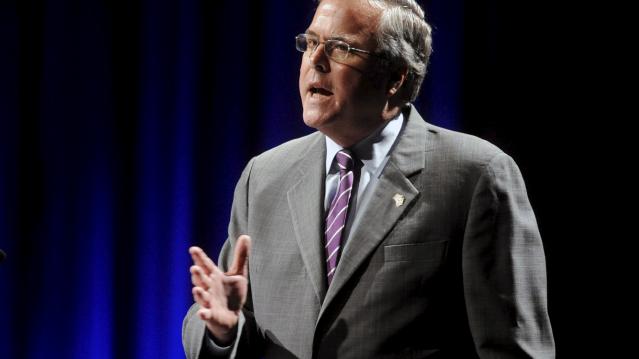Jeb Bush Wants Me to Do More What?

Yesterday, Republican hopeful Jeb Bush ticked off hard-working Americans everywhere when he said that in order to grow the economy, people had to work longer hours. Here’s the skinny:
What He Said: “My aspiration for the country--and I believe we can achieve it--is 4 percent growth as far as the eye can see. Which means we have to be a lot more productive. Workforce participation has to rise from its all-time modern lows. It means that people need to work longer hours and, through their productivity, gain more income for their families. That’s the only way we’re going to get out of this rut that we’re in.”
This Is All We Heard: “People need to work longer hours.” And “Let them eat cake.” Then we played Hall & Oates “Out of Touch” a few times.
Related: Microsoft Hangs Up on Nokia, Cuts 7,800 Jobs
Then He Talked Some More. Later Bush clarified that his remarks really were in reference to underemployment and part-time workers. His campaign cited stark statistics of falling workforce participation, which are currently at their lowest level since October 1977. It also was a dig at Obamacare, which had previously defined the work week for a full-time employee at 30 hours, causing many employers to cap work weeks at 29 hours.
Who’s right? Well, as it turns out, both are. Workforce participation in the U.S. is at 62.6 percent. The Bureau of Labor says there are 6.5 million people in the U.S. who are working part-time because they can’t find full-time employment.
But it’s also true that many Americans are already putting in longer hours, and taking fewer and shorter vacations. A recent Time cover story called out, “Save the American Vacation” and referred to us as a “no-vacation nation.” A 2014 Gallup poll claims the average work week for many Americans who work full-time is more like 47 hours (not 40), and 21 percent report they work between 50 to 59 hours per week. Another 18 percent said they work 60 hours or more. (Only the South Koreans work harder, but we really don’t want to emulate them.)
That didn’t stop Democratic rivals from hollering back. Presidential candidate Hillary Clinton Tweeted: “Anyone who believes Americans aren’t working hard enough hasn’t met enough American workers.”
So there—for now.
Budget ‘Chaos’ Threatens Army Reset: Retired General
One thing is standing in the way of a major ongoing effort to reset the U.S. Army, writes Carter Ham, a retired four-star general who’s now president and CEO of the Association of the U.S. Army, at Defense One. “The problem is the Washington, D.C., budget quagmire.”
The issue is more than just a matter of funding levels. “What hurts more is the erratic, unreliable and downright harmful federal budget process,” which has forced the Army to plan based on stopgap “continuing resolutions” instead of approved budgets for nine straight fiscal years. “A slowdown in combat-related training, production delays in new weapons, and a postponement of increases in Army troop levels are among the immediate impacts of operating under this ill-named continuing resolution. It’s not continuous and it certainly doesn’t display resolve.”
Pentagon Pushes for Faster F-35 Cost Cuts

The Pentagon has taken over cost-cutting efforts for the F-35 program, which has been plagued by years of cost overruns, production delays and technical problems. The Defense Department rejected a cost-saving plan proposed by contractors including principal manufacturer Lockheed Martin as being too slow to produce substantial savings. Instead, it gave Lockheed a $60 million contract “to pursue further efficiency measures, with more oversight of how the money was spent,” The Wall Street Journal’s Doug Cameron reports. F-35 program leaders “say they want more of the cost-saving effort directed at smaller suppliers that haven’t been pressured enough.” The Pentagon plans to cut the price of the F-35A model used by the Air Force from a recent $94.6 million each to around $80 million by 2020. Overall, the price of developing the F-35 has climbed above $400 billion, with the total program cost now projected at $1.53 trillion. (Wall Street Journal, CNBC)
Chart of the Day - October 6, 2017
Financial performance for insurers in the individual Obamacare markets is improving, driven by higher premiums and slower growth in claims. This suggests that the market is stabilizing. (Kaiser Family Foundation)
Quote of the Day - October 5, 2017
"The train's left the station, and if you're a budget hawk, you were left at the station." -- Rep. Mark Sanford, R-S.C.


